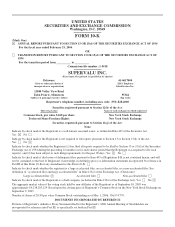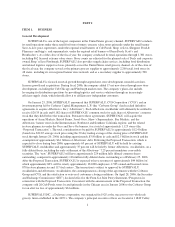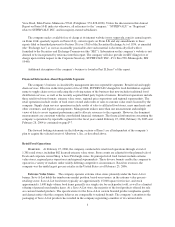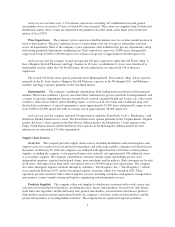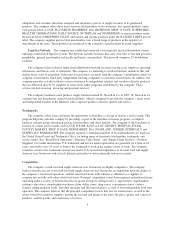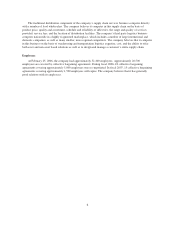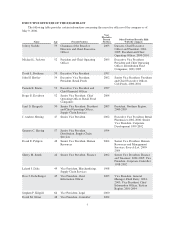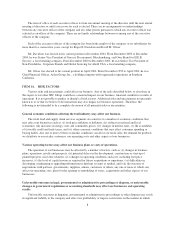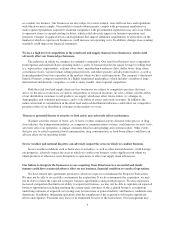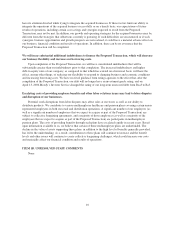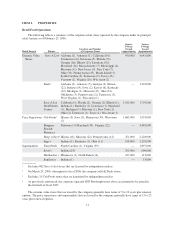Albertsons 2006 Annual Report Download - page 9
Download and view the complete annual report
Please find page 9 of the 2006 Albertsons annual report below. You can navigate through the pages in the report by either clicking on the pages listed below, or by using the keyword search tool below to find specific information within the annual report.we conduct our business. Our businesses are also subject to various federal, state and local laws and regulations
with which we must comply. Our inability to timely obtain permits, comply with government regulations or
make capital expenditures required to maintain compliance with governmental regulations may affect our ability
to open new stores or expand existing facilities, which could adversely impact our business operations and
prospects. Changes in applicable laws and regulations that impose additional requirements or restrictions on the
manner in which we operate our businesses could increase our operating costs. In addition, changes in accounting
standards could impact our financial statements.
We face a high level of competition in the retail food and supply chain services businesses, which could
adversely affect our financial performance.
The industries in which we compete are extremely competitive. Our retail food business faces competition
from regional and national chains operating under a variety of formats that devote square footage to selling food
(i.e. supercenters, supermarkets, extreme value stores, membership warehouse clubs, dollar stores, drug stores,
convenience stores, various formats selling prepared foods, and other specialty and discount retailers), as well as
from independent food store operators in the markets where we have retail operations. The company’s third party
logistics business competes nationwide in a highly fragmented marketplace, which includes a number of large
international and domestic companies, as well as many smaller, more regional competitors.
Both the retail food and supply chain services businesses are subject to competitive practices that may
affect: (i) the prices at which we are able to sell products at our retail locations, (ii) sales volume, (iii) the ability
of our distribution customers to sell products we supply, which may affect future orders, (iv) changes in
demographics and consumer preferences, and (v) our ability to attract and retain customers. In addition, the
nature and extent of consolidation in the retail food and food distribution industries could affect our competitive
position or that of our distribution customers in the markets we serve.
Threats or potential threats to security or food safety may adversely affect our business.
Wartime activities, threats of terror, acts of terror or other criminal activity directed at the grocery or drug
store industry, the transportation industry, or computer or communications systems, could increase security costs,
adversely affect our operations, or impact consumer behavior and spending and customer orders. Other events
that give rise to actual or potential food contamination, drug contamination, or food-borne illness could have an
adverse effect on our operating results.
Severe weather and national disasters can adversely impact the areas in which we conduct business.
Severe weather conditions such as hurricanes or tornadoes, as well as other natural disasters, could damage
our properties, adversely impact the areas in which we conduct our business or the suppliers from whom we
obtain products or otherwise cause disruptions to operations or affect our supply chain efficiencies.
Our failure to integrate the businesses we are acquiring from Albertsons in a successful and timely
manner could have a material adverse effect on our business, financial condition or results of operations.
We have entered into agreements pursuant to which we expect to consummate the Proposed Transaction.
We may not be able to successfully consummate the acquisition. If we do consummate the acquisition, we may
not be able to realize the expected synergies, business opportunities and growth prospects. We may experience
increased competition that limits our ability to expand our business, we may not be able to capitalize on expected
business opportunities including retaining the current retail customers of the acquired business, assumptions
underlying estimates of expected cost savings may be inaccurate or general industry and business conditions may
deteriorate. In addition, integrating operations after the completion of the acquisition will require significant
efforts and expenses. Personnel may leave or be terminated because of the transactions. Our management may
9

